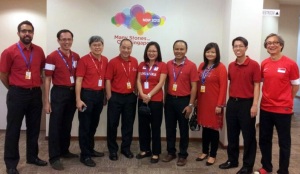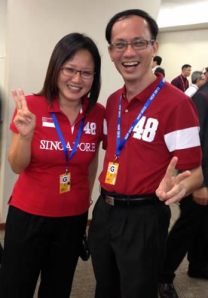Yesterday I watched the movie Jobs. It was about Steve Jobs and his story with Apple Inc.
It wasn’t exactly an exciting movie in terms of drama or action. However, I felt there are some interesting lessons for entrepreneurs, wanna-be entrepreneurs and people trying to understand successful entrepreneurs (including policymakers). So I decided to summarise into the observations below. Of course, Steve Jobs is not your ordinary entrepreneur. After all, Apple became the most valuable company on earth last year. Still, he shared some common characteristics with other entrepreneurs.
1. Entrepreneurs smell out opportunities. Jobs was at Wozniak’s house when he spotted the motherboard that Wozniak had built. He enquired and sensed it could be something big. He convinced Wozniak to take it to a pitching session at Stanford University to promote the idea. Out of that primitive motherboard eventually came the Apple II computer.
There are often opportunities everyone. Some opportunities are in the form of everyday news. An entrepreneur hears of news of say some problem, and could sense perhaps he could make a business out of it if he/she could create a cost effective solution to the problem. Or the entrepreneur could see some new inventions in their primitive state and match it to market needs and trends. It is part intuition and part discipline. Intuition because there is often no clear way to identify opportunities and you have to figure how to connect disjointed dots together. Discipline because one must keep looking and reminding oneself to look for opportunities. But to many others, news is just news. Raw inventions are just raw inventions. Nothing else. Many people will look at the same piece of information but only some can make things happen with that piece of information.
2. Entrepreneurs sell. Steve was not the one with the engineering ability. He sold the idea to Wozniak to leave HP and make his original invention big. He sold the motherboard (as first version of Apple) to the owner of Byte Computer shop. He convinced others to work for him in his garage. He convinced early investor Mike to fund the venture. And of course the world has seeen how well Jobs could sell his ideas. True-bred entrepreneurs never stop selling, whenever he/she smells an opportunity to do so. And when you sell, keep the message concise. Master that elevator pitch. You often need to sell your idea in a minute to get any chance of attracting further attention from your audience.
3. Entrepreneurs are resilient. The idea was new and the business unproven. The first sales pitch at Stanford University was quite a failure though it resulted in a small break with the owner of Byte computer shop. The first version, just a raw motherboard was not well received by Byte Computer. So they decided the next version must be a complete set, neatly assembled into a small compact casing. He was told it was impossible to make the power unit small enough, silent enough and cool enough to fit into the casing. He pursued leads and eventually found an engineer who could make it.
The movie showed Jobs making hundreds (or thousands) of calls to Venture Capitalists (VCs) to get the funding. That’s a pretty familiar scene for most start-up entrepreneurs. You will get rejected lots of times, whether it is pitching for funds or trying to sell your products. Get over each rejection, learn why and look forward to the next pitch. Never wallow in the rejections. Use them as lessons on how to make better pitch or adjust your business plans or products. Look forward. The first investor, Mike came because Jobs had pestered Mike’s friend so hard that he told Mike to do him a favour and just go see what the deal was about.
4. Great entrepreneurs inspire confidence. It is hard to get people to buy in to your ideas or products when they are raw. True entrepreneurship is like creating a beautiful picture out of a blank piece of paper. You try to make things happen out of nothing. It is hard for others to buy into your vision with nothing much to show. Why would a shrewd investor like Mike invest US$90,000 plus extend a loan of (I think) US$250,000 to Apple Inc. when it was just a garage set-up without a ready product. What makes investors and customers buy in to ideas when they are still raw? Often, it is the entrepreneur. Entrepreneurs who believe deeply in their vision exuberate the confidence that is almost contagious.
5. Start-up entrepreneurs are driven by passion. A reason why great entrepreneurs can inspire confidence is because they are themselves driven by passion. Once they are locked onto a idea they passionately believe in, they can live, eat, sleep and dream about that idea and they pursue it until it come to fruition. That passion is evident in their tone as they speak of their ideas and products. And the more they immerse themselves in an idea, new creative thoughts on how to improve on the idea can come from just about anywhere, even when taking a shower or when driving or when they are about to fall asleep. In the movie, we saw how Jobs went about relentlessly trying to perfect the motherboard that Wozniak first made. He also went about determined to make the perfect typeface for their word processor, to make Lisa the ideal computer, to create Macintosh into the dream product that he could not do for Lisa and to keep his products simple yet elegant. Jobs was so over consumed with his passion that he was often unforgiving to staff who failed to share the same passion.
If we hope to inspire a new generation of creative entrepreneurs, we will need to give our youth space to pursue their passion. If we want to start them young, the space to explore ideas must be allowed even while they are in school. Parents need to also understand their children and give them the space to explore.
6. Entrepreneurs are doers. They make things happen. Jobs was certainly driven to make his ideas come alive by pushing everyone towards a common target. Even after being axed from his own company, he went on to start NeXT Computer and Pixar. He was constantly making things happen.
I once read an excellent interview with Bill Gates when he was then the richest man on earth. He was asked how he became the richest man. He said, “First, I was at the right place at the right time. Second, I had the vision. Third and most important, I took action.” Gates certainly grew up in exciting times. The personal computer industry was starting to boom. But so were several billion other people who were in the world at the same time. Gates had the vision that software would power the PCs and there was a gap in the market for this. I am reminded of a friend whom several years ago after reading a news report of a booming new business, said he thought of that idea a few years back. I asked him, “So what did you do about that idea?” My friend is still a professional manager in a large local company today. Gates went on to act on his vision. So did Jobs and many other entrepreneurs.
Sometimes I meet people who tell me they have some wonderful big ideas that will change the world. Some are so secretive about their ideas. I would tell them ideas are cheap. Execution is key. Operationalize your idea and be prepared to sweat it out.
7. Entrepreneurs are often rebels. Jobs was definitely one. He quit Reeds College to explore what else life could offer him. He couldn’t fit into the culture of Atari even though he successfully met the challenge to produce the game his boss had wanted. He was often restless and pushing out new ideas. This may not be true of all entrepreneurs but it is often true of those that thrive on innovation. They generally don’t like rules. Rules and norms wear them down.
This is where I feel it gets hard for us to emulate the type of start-up successes that happen so often in USA with our existing culture. We are quite bound by rules and are conditioned to opt for the secure path. Our education system tend to focus on the examinations. There is little room for students to creatively explore ideas. Those that do well academically are sucked into a system of being professional managers. The risks and stigma of failure are high in our culture. Operating costs are high.
Having said that, I do see more young and restless ones dabbling with business ideas. Some jumped into business right after graduating or even before completing their studies. Hopefully our education system can take more effort to cultivate creative exploration by students.
8. Entrepreneurs don’t work alone. As bright and capable as anyone can be, you need a team if you are to grow your business from an idea into a product, and from a product into a scalable business. Often, businesses fail along the way because a good idea need not necessary become a good product without the right team to work on it. A good product will need a team to market, support and constantly innovate. Jobs had Wozniak, the bright engineer as co-founder. He rounded up people to work when the first order came in. He needed another engineer to create the power supply unit that fitted what he wanted. And as Apple Inc. grew, he had to create a structure to manage thousands of employees. The entrepreneur can be the visionary to draw people in but in order for any business to grow, an effective team must be organised.
Of course, the movie also showed some dark sides of Jobs’ life. He was intolerant and brutal, even to those close to him. I rather not comment on these aspects as everyone has weaknesses, and I am not certain how much of what was shown were dramatized to make into a movie. This post is not to glorify Jobs as well. As one who had walked the start-up path before, I identified with the journey Jobs went through, though of course mine is nowhere as dramatic. Still, the lessons are pretty much common for those who choose to take such a path. So while the movie is not spectacular in terms of drama or action, catch it if you want a peek into the mind of a start-up entrepreneur.


